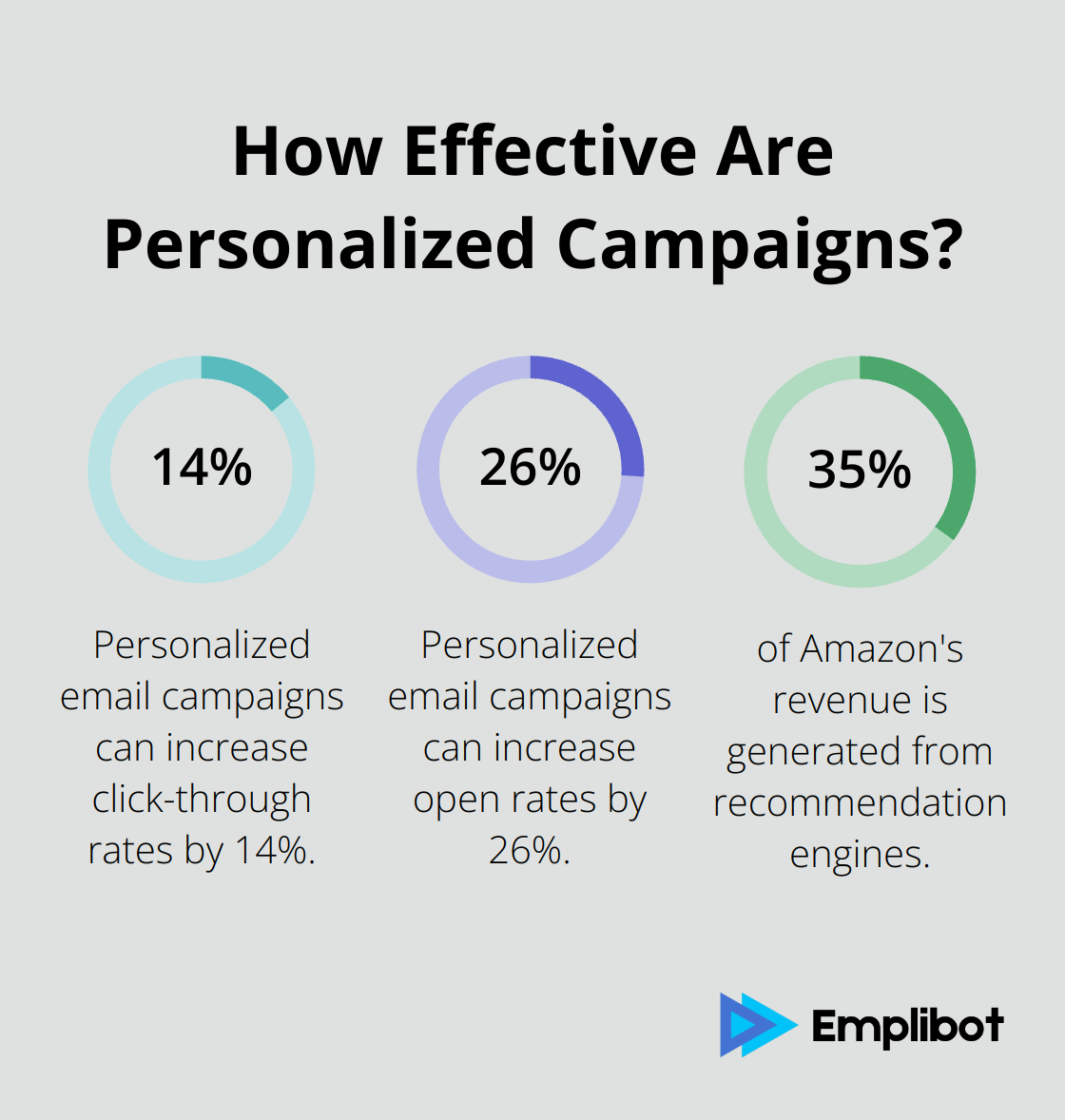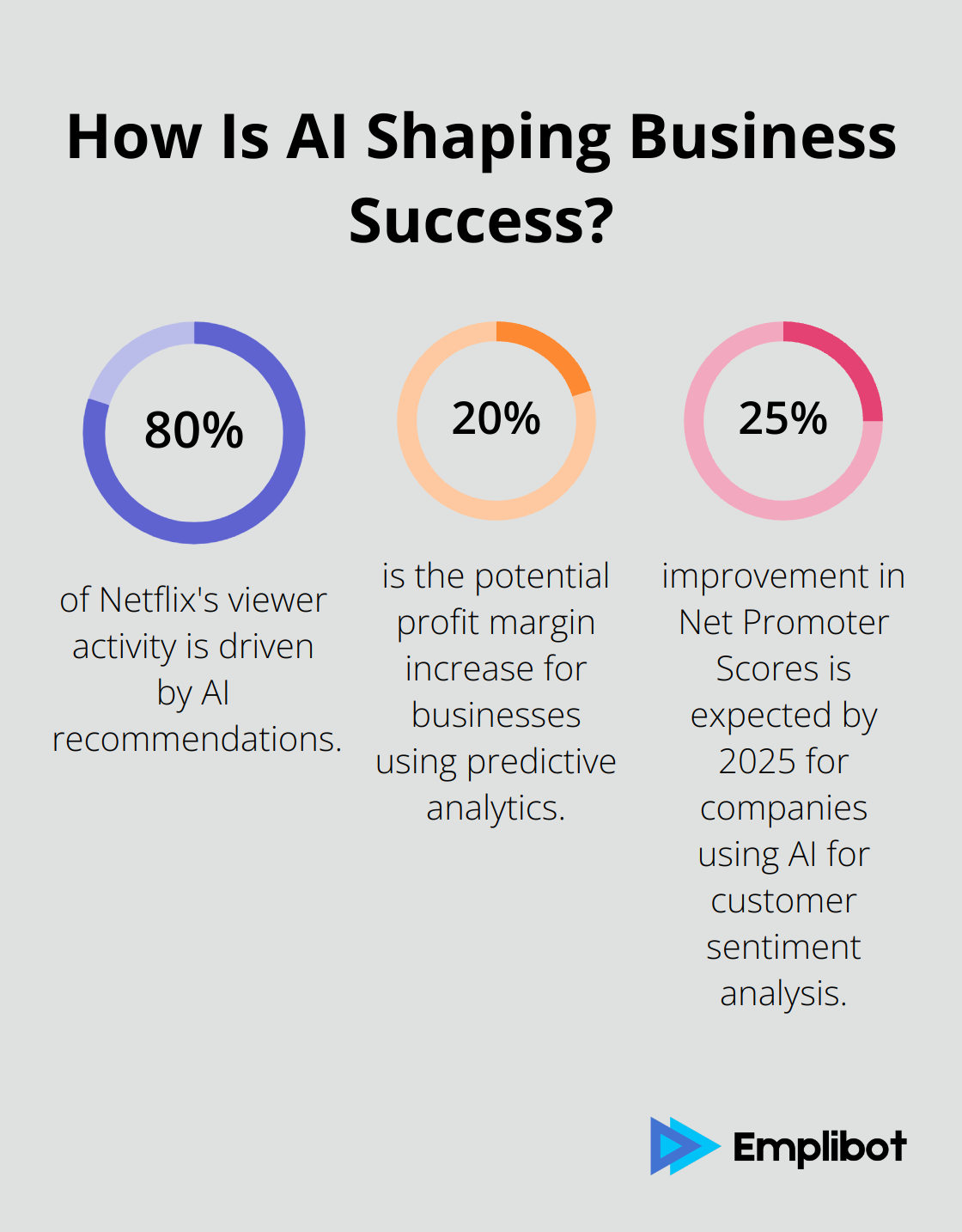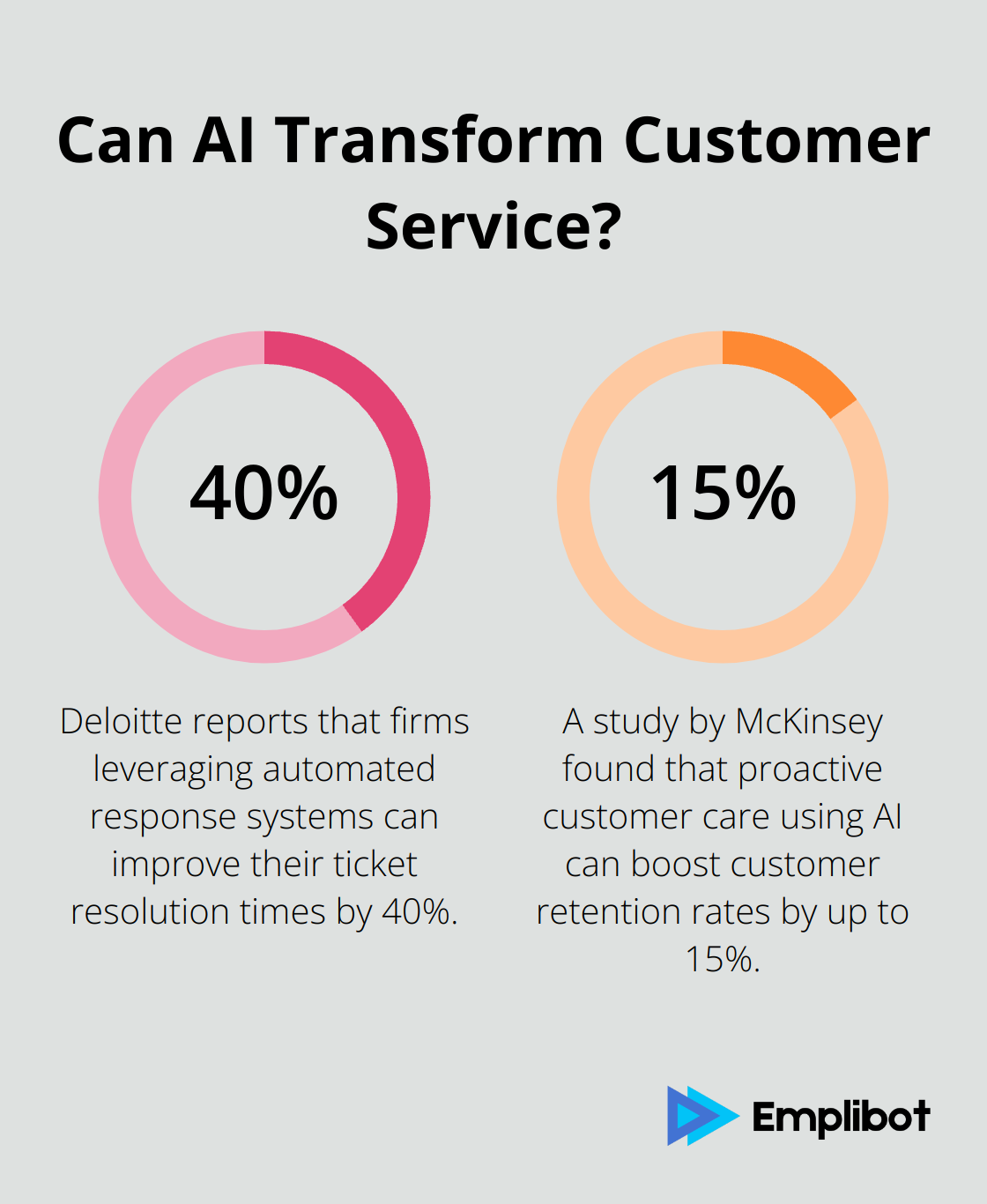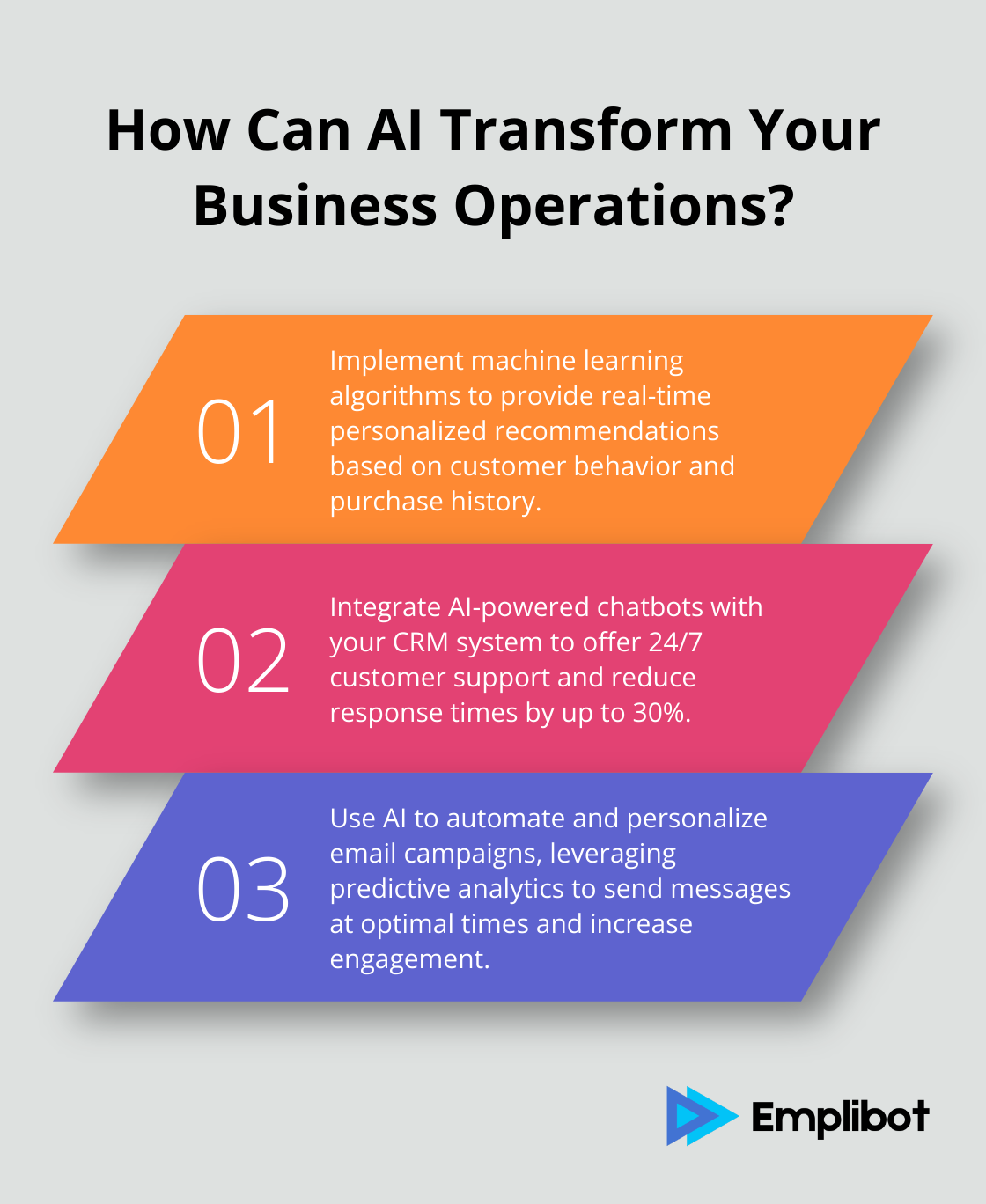AI is revolutionizing customer engagement by providing more personalized and efficient interactions. Companies are leveraging AI to offer tailored recommendations, real-time assistance through chatbots, and customized email campaigns.
At Emplibot, we believe that understanding customer behavior through AI-driven insights can significantly enhance customer satisfaction. Businesses are already seeing the benefits of AI in customer support, from virtual assistants to proactive issue resolution.
Inhalt
ToggleHow Does AI Personalize Customer Interactions?
AI for Personalized Recommendations
Personalized recommendations aren’t just a trend; they’re a powerful tool proven to boost engagement and sales. Using AI, companies can analyze customer behavior, past purchases, and preferences to generate accurate recommendations in real-time. Amazon, which generates 35% of its revenue from recommendation engines, showcases how impactful this can be. Retailers and e-commerce businesses should implement machine learning algorithms capable of processing vast datasets to craft personalized shopping experiences. Leveraging AI-driven customer segmentation can also help deliver more relevant product suggestions and enhance user satisfaction.
Chatbots for Real-Time Assistance
Chatbots have evolved into indispensable tools for customer support. These AI-powered assistants offer immediate responses, 24/7 availability, and efficient problem resolution. For instance, Sephora’s chatbot on Facebook Messenger can book makeovers, answer beauty questions, and offer personalized product recommendations, boosting customer engagement. Companies looking to deploy chatbots should ensure integration with their CRM systems to provide contextually aware support. Moreover, enhancing chatbots with natural language processing (NLP) can vastly improve customer interactions by making conversations more intuitive and human-like. Investing in well-designed chatbots can reduce support costs by up to 30%, as shown by various case studies.
Customized Email Campaigns
Email campaigns are significantly more effective when personalized. AI allows for dynamic content creation, tailoring messages based on user behavior and preferences. According to a study by Campaign Monitor, personalized email campaigns can increase open rates by 26% and click-through rates by 14%. Businesses can utilize AI to segment their audience more precisely, sending targeted messages that resonate better. Tools like predictive analytics enable companies to send emails at optimal times, enhancing the likelihood of engagement. For specific email marketing automation strategies, businesses can refer to proven techniques for both engagement and conversion. Using AI to automate and personalize email outreach can lead to a higher return on investment, making it a non-negotiable strategy for modern marketers.

Incorporating AI into these facets of customer interaction not only enhances engagement but also ensures more meaningful experiences that foster loyalty and satisfaction. The journey towards AI-driven customer personalization is proven to be both beneficial and necessary in today’s competitive market.
How Can AI Provide Customer Insights?
Utilizing AI to gather and analyze customer insights is instrumental in crafting more effective engagement strategies.
Analyzing Customer Behavior
AI excels in tracking and analyzing customer behavior patterns. By examining browsing history, purchase activity, and interaction history, AI can deduce preferences and predict future actions. Netflix, which attributes over 80% of its viewer activity to recommendations driven by AI, exemplifies the effectiveness of this approach. Companies should leverage AI-based analytics tools to identify high-value customers and tailor their marketing efforts accordingly. Machine learning models can also flag unusual behavior, helping businesses mitigate churn before it occurs.
Predictive Analytics for Customer Needs
Predictive analytics is a game-changer for proactive customer engagement. AI can predict future customer needs by analyzing past interactions and external data points. A study by Forrester found that businesses using predictive analytics can increase their profit margins by up to 20%. Retailers can use these insights to stock products that align with predicted demand, reducing inventory costs. Moreover, predictive models can pinpoint the best times to engage with customers, ensuring higher responses. Implementing AI-driven predictive tools is not just an option but a necessity for staying competitive in today’s market.
Sentiment Analysis for Better Understanding
Understanding customer sentiment has never been more important. AI-powered sentiment analysis tools can assess customer feedback from various channels such as social media, reviews, and surveys. According to Gartner, by 2025, companies that use AI for customer sentiment analysis will improve their Net Promoter Scores by 25%. Tools like sentiment analysis can help businesses understand the underlying emotions behind customer reviews, enabling them to address issues more effectively and enhance brand loyalty. By integrating sentiment analysis with their CRM systems, companies can maintain a pulse on customer satisfaction and respond dynamically to any shifts in sentiment.

Incorporating these AI-driven strategies can revolutionize how businesses comprehend and engage with their customers, driving more effective marketing and superior customer experiences. For more on predictive analytics, you can read about examples in predictive analytics in business.
How Can AI Enhance Customer Support?
AI is making waves in the customer support sector by providing faster and more precise assistance. Integrating AI can decrease response times, reduce costs, and improve customer satisfaction.
AI-Powered Virtual Assistants
Virtual assistants are transforming customer support by providing instant, round-the-clock service. These AI-driven tools handle a variety of tasks, from answering common queries to guiding users through processes. For example, Bank of America’s Erica offers financial advice, tracks spending, and suggests money-saving tips to users 24/7. Businesses should invest in virtual assistants that can handle more than just basic tasks. Advanced natural language processing (NLP) capabilities enable these assistants to understand context, offering human-like interactions. Research shows that virtual assistants can reduce customer service costs by up to 25%.
Automated Response Systems
Automated response systems are essential for handling high volumes of customer inquiries efficiently. These systems use AI to generate immediate responses based on predefined rules and patterns. Companies like UPS use automated systems to track shipments and update customers without human intervention. Businesses should deploy automated tools that integrate seamlessly with existing customer relationship management (CRM) systems. This integration allows for real-time data access, ensuring the responses are relevant and accurate. Deloitte reports that firms leveraging automated response systems can improve their ticket resolution times by 40%.
Proactive Issue Resolution
Proactive issue resolution is a major advantage of using AI in customer support. AI can predict potential problems by analyzing historical data and customer interactions, enabling companies to address issues before they escalate. For instance, telecom companies use AI to identify network issues and notify affected customers before they even notice a problem. Implementing AI tools that provide real-time monitoring and alerts can significantly enhance customer satisfaction. A study by McKinsey found that proactive customer care using AI can boost customer retention rates by up to 15%. This proactive approach not only minimizes disruption but also builds trust and loyalty among customers.

Incorporating AI across customer support channels ensures faster, more effective service, leading to improved customer experiences. For a deeper dive into customer support automation strategies, check out AI-driven customer outreach. The future of customer support lies in harnessing AI to provide efficient and personalized service that meets and exceeds customer expectations.
Wrapping Up
AI’s role in enhancing customer engagement is undeniable, offering benefits such as personalized interactions, efficient support, and improved insights. By utilizing AI-powered recommendations, chatbots, and customized email campaigns, businesses can create more meaningful connections with their customers. Moreover, AI helps analyze customer behavior, predict needs, and understand sentiments, leading to more proactive and effective engagement strategies.

For businesses looking to implement AI, it’s crucial to invest in the right tools and ensure seamless integration with existing systems. Leveraging real-time data and machine learning models can significantly boost efficiency and customer satisfaction.
The adoption of AI in customer support provides faster responses and anticipates issues before they become problems, enhancing overall customer experience. Embracing AI in these areas not only improves engagement but also builds trust and loyalty among customers.
For those seeking to streamline their content strategy, Emplibot can help by publishing SEO-friendly articles automatically. To explore more about how AI can be a game-changer for your business, visit Emplibot.
Incorporating AI in customer engagement is not just beneficial but necessary to remain competitive. With continuous improvement and adaptation, AI can drive superior customer experiences and long-term success.











